- Home
- Quizzes
- My Quiz Activity
- Newsletters
- Sports Betting
- MY FAVORITES
- Add Sports/Teams
- SPORTS
-
NFL
- NFL Home
- Arizona Cardinals
- Atlanta Falcons
- Baltimore Ravens
- Buffalo Bills
- Carolina Panthers
- Chicago Bears
- Cincinnati Bengals
- Cleveland Browns
- Dallas Cowboys
- Denver Broncos
- Detroit Lions
- Green Bay Packers
- Houston Texans
- Indianapolis Colts
- Jacksonville Jaguars
- Kansas City Chiefs
- Las Vegas Raiders
- Los Angeles Chargers
- Los Angeles Rams
- Miami Dolphins
- Minnesota Vikings
- New England Patriots
- New Orleans Saints
- New York Jets
- New York Giants
- Philadelphia Eagles
- Pittsburgh Steelers
- San Francisco 49ers
- Seattle Seahawks
- Tampa Bay Buccaneers
- Tennessee Titans
- Washington Commanders
-
MLB
- MLB Home
- Arizona Diamondbacks
- Atlanta Braves
- Baltimore Orioles
- Boston Red Sox
- Chicago White Sox
- Chicago Cubs
- Cincinnati Reds
- Cleveland Guardians
- Colorado Rockies
- Detroit Tigers
- Houston Astros
- Kansas City Royals
- Los Angeles Angels
- Los Angeles Dodgers
- Miami Marlins
- Milwaukee Brewers
- Minnesota Twins
- New York Yankees
- New York Mets
- Oakland Athletics
- Philadelphia Phillies
- Pittsburgh Pirates
- San Diego Padres
- San Francisco Giants
- Seattle Mariners
- St. Louis Cardinals
- Tampa Bay Rays
- Texas Rangers
- Toronto Blue Jays
- Washington Nationals
-
NBA
- NBA Home
- Atlanta Hawks
- Boston Celtics
- Brooklyn Nets
- Charlotte Hornets
- Chicago Bulls
- Cleveland Cavaliers
- Dallas Mavericks
- Denver Nuggets
- Detroit Pistons
- Golden State Warriors
- Houston Rockets
- Indiana Pacers
- Los Angeles Clippers
- Los Angeles Lakers
- Memphis Grizzlies
- Miami Heat
- Milwaukee Bucks
- Minnesota Timberwolves
- New Orleans Pelicans
- New York Knicks
- Oklahoma City Thunder
- Orlando Magic
- Philadelphia 76ers
- Phoenix Suns
- Portland Trail Blazers
- Sacramento Kings
- San Antonio Spurs
- Toronto Raptors
- Utah Jazz
- Washington Wizards
-
NHL
- NHL Home
- Anaheim Ducks
- Arizona Coyotes
- Boston Bruins
- Buffalo Sabres
- Calgary Flames
- Carolina Hurricanes
- Chicago Blackhawks
- Colorado Avalanche
- Columbus Blue Jackets
- Dallas Stars
- Detroit Red Wings
- Edmonton Oilers
- Florida Panthers
- Los Angeles Kings
- Minnesota Wild
- Montreal Canadiens
- Nashville Predators
- New Jersey Devils
- New York Islanders
- New York Rangers
- Ottawa Senators
- Philadelphia Flyers
- Pittsburgh Penguins
- San Jose Sharks
- Seattle Kraken
- St. Louis Blues
- Tampa Bay Lightning
- Toronto Maple Leafs
- Vancouver Canucks
- Vegas Golden Knights
- Washington Capitals
- Winnipeg Jets
- NCAAF
- NCAAM
- Boxing
- Entertainment
- Lifestyle
- Golf
- MMA
- Soccer
- Tennis
- Wrestling
- More Sports
- RESOURCES
- My Account
- YB on Facebook
- YB on Twitter
- YB on Flipboard
- Contact Us
- Privacy Policy
- Terms of Service

The 50 best USA Summer Olympic moments of all time
The Tokyo Olympics are nearly upon us, and plenty of memories are sure to be made for American athletes. As we celebrate these Games, it's time to look back at 50 of the greatest, or most notable, Summer Olympic moments involving athletes from the United States.
Double the dominance (1912)
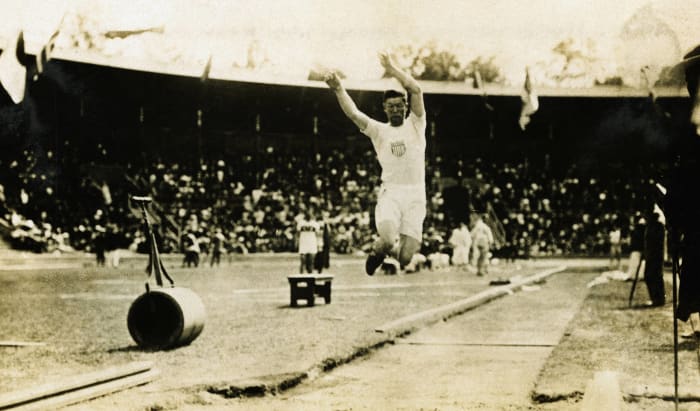
It was at the fifth-ever Summer Olympics at Stockholm in 1912, when the great Jim Thorpe showed just how versatile an athlete he was. He won dual goal medals in the decathlon (a record 8,413 points that stood for more than almost two decades) and the newly unveiled pentathlon. Based on his overall performance at the 1912 games, Thorpe, according to Olympic lore, was the first to be dubbed the "Greatest Athlete in the World." In years since Thorpe was stripped of those medals -- thus nullifying the fact he's first Native-American Olympic gold medalist -- by the International Olympic Committee for a questionable amateur status.
High schooler Robinson faster than the rest (1928)

Hailing from southeast suburban Chicago and a student at the famed Thornton Township High School in Harvey, Ill, train-chasing Betty Robinson was one of the first great track phenoms in U.S. history. In just her second-ever race at age 16, Robinson matched the world record in the 100 meters. She eventually qualified for the 1928 Summer Games at Amsterdam and became the first woman to win the 100 at the Olympics. She also earned silver as a member of the 4×100 relay team.
Age nothing to Gestring (1936)

The 1936 Summer Olympics in Berlin might be known for that historic, breakout moment by a certain legendary American star. However, there were also other notable performances by U.S. athletes during the Games. Near the top of the list was 13-year-old diver Marjorie Gestring, who stunned many around the sport in the U.S. by qualifying for the Games. With her victory in the 3-meter springboard diving competition, Gestring became the youngest athlete to win gold at the Olympics.
Stephens' smashing performance (1936)

It's also worth noting that the 1936 Games featured a female double-gold winner for the United States. Her name was Helen Stephens, and her claim to fame from these Games was unseating reigning champion and world-record holder Stanisława Walasiewicz of Poland, to win the 100 meters -- in a swift 11.5 seconds. She then anchored the American 4×100 relay team to a gold-medal performance. Stephens' interaction with German dictator Adolf Hitler was quite entertaining, as well.
Owens shows up Hitler (1936)
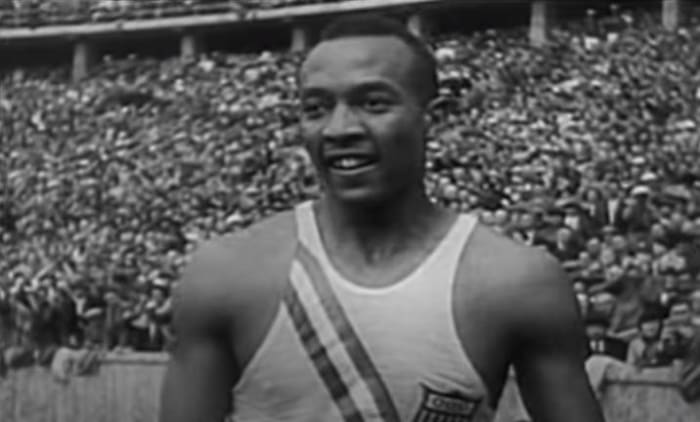
Jesse Owens was a star even before he won four gold medals (100 meters, 200 meters, 4x100 relay, long jump) at the 1936 Summer Games in Berlin. However, those victories were essentially a slap in the face to Adolf Hitler, who looked on while a black man dominated these Games and shot holes in the fuhrer's myth of "Aryan Supremacy." It was not only one of the great Olympic moments of all time, but perhaps most importantly, when it came to the relationship between sports and politics on an international stage.
Sweet (double) diving sweep (1948)

Maybe it wasn't a major surprise that the United States dominated the diving competition at the 1948 Olympics in London. It was one of the premier events for the Americans at the time, so they put themselves in a pretty good position for success at the Games. The U.S. swept the three medal spots in both the men's and women's 3-meter springboard event, and also went 1-2, respectively, in the 10-meter platform. Bruce Harlan, Sammy Lee, Vicki Draves, and Patsy Elsner each won two medals apiece.
Wilma has the will (1960)

The great Wilma Rudolph got her first test of Olympic success in 1956 by winning a bronze medal as part of the American 4x100-meter relay team. However, it was the 1960 Games at Rome where Rudolph earned the title of the "fastest woman in the world." She took home gold in both the 100 and 200 meters, and also in the 4x100 relay. All amazing accomplishments for someone who dealt with pneumonia, scarlet fever, and polio in her early years.
Rafer's remarkable run (1960)

The will to compete was strong with Rafer Johnson during the decathlon in 1960 in Rome. After earning a silver medal in the event four years earlier at Melbourne, Johnson found himself in a duel for gold with Taiwan rival C.K. Yang. It came down to the 1,500-meter finale, where both had emptied the tank just to cross the finish line. Johnson didn't have to win but needed to stay within 10 seconds of Yang's time to earn gold. He was even closer. Yang won the event, but Johnson was close behind and dropped his head on Yang's shoulder when he had finished, with his energy spent and gold accomplished.
The Kid named Cassius (1960)

Before he was Muhammad Ali, Cassius Clay was a relative unknown boxer on the international stage. Sure, Clay was a promising pugilist in his home state of Kentucky and won an AAU national championship, but it was his performance at the 1960 Olympics in Rome that truly gave the world a glimpse of the greatness that was to come. Clay won gold in the light-heavyweight division and did not stop from there.
Mills goes the distance for upset (1964)

Nearly a half-decade later, Billy Mills' improbable victory in the 10,000 meters at the 1964 Olympics in Tokyo is still considered one of the biggest upsets in the history of the Games. Mills was an unknown commodity and certainly not considered a threat to Australia's Ron Clarke, the undisputed favorite in the race. However, on the final lap, Mills kicked into high gear for the burst of his life to outlast Clarke and set an Olympic record with his winning time of 28:24.4. Mills remains the only American to win the 10,000.
That's four for Oerter (1968)

In 1956, Al Oerter was the surprise winner of the discus competition in Melbourne. However, it proved to be the start of a historic run for the American. By 1968, at age 32, Oerter was still a contender on the international scene and trying to become the first track-and-field Olympian to win four consecutive golds. Oerter, though, wasn't favored at Mexico City but managed to top favored teammate Jay Silvester with an Olympic-record throw of 64.78 meters.
Fosbury "flops" to gold (1968)

Not only did the legendary Dıck Fosbury win the high jump at the 1968 Games in Mexico City, he essentially re-invented, or revolutionized, the event with his famed "Fosbury Flop." In simple terms, Fosbury was the first high jumper to use a backward, layout maneuver to clear the bar. That technique quickly became copied worldwide and, obviously, is the preferred method of clearing the bar in the present day.
Beamon's big leap (1968)

The historic accomplishments at the 1968 Summer Games at Mexico City didn't end with Al Oerter or Dıck Fosbury. Bob Beamon's performance in the long jump at the Games remains one of the great individual accomplishments in Olympic history. The favorite to win the event at Mexico City, Beamon not only prevailed but shattered the world record with his leap of 8.90 m (29.2 feet). His historic hop stood as the record for nearly 23 years and remains the mark to beat in Olympic competition.
Fists of protest (1968)

There's arguably no more powerful image than that of American sprinters Tommie Smith and John Carlos standing on the medal podium, each with one black-gloved fist raised following the 200-meter race and while the "Star Spangled Banner" played at the 1968 Mexico City Games. The Black Power salute from Smith, who won gold, and bronze-medalist Carlos both drew inspiration and condemnation -- depending on one's political viewpoint. If there was ever a doubt sports and politics were intertwined, it was put to rest on Oct. 16, 1968.
Munich basketball debacle (1972)

It's been almost 50 years since the U.S. men's basketball team seemingly had its gold medal stolen at the 1972 Summer Games at Munich. The Americans thought they had a one-point victory over the Soviet Union, but three inbounds-plays later with some questionable time added on the clock, Alexander Belov took a full-court pass and turned it into the winning layup for the USSR. The Americans immediately protested -- to no avail. Then boycotted the medal ceremony in which they were to receive their silver medals. It's far from a great U.S. Olympic moment, but an important one nonetheless.
Spitz's sensational seven (1972)

The U.S. basketball loss and Israeli athlete massacre overshadowed some positive moments of historical proportions at the Munich Games in 1972. None bigger than the seven gold medals American swimmer Mark Spitz won at these games. He individual gold in the 100-meter freestyle, 200 free, 100-meter butterfly, 200 fly, and as a member of the 4x100-meter free relay, 4x200 free relay, and 4x100 medley relay. Spitz's record-medal count for a single Games lasted 36 years.
The original "Dream Team?" (1976)

We'll get to USA Basketball's "Dream Team" from 1992 in a bit. But arguably, the original U.S. Olympic dream lineup came in 1976 with the nation's boxing squad that was filled with future legends. "Sugar" Ray Leonard, brothers Leon and Michael Spinks, Leo Randolph and Howard Davis each won gold. Meanwhile, Charles Mooney took home a silver, and John Tate earned bronze. Leonard and the Michael Spinks' are Hall of Famers and Leon Spinks beat Muhammad Ali for the heavyweight title in 1978.
Jenner earns iconic status (1976)
Before he transitioned to Caitlyn Jenner and decided to run for Governor of California, Bruce Jenner put forth one of the great Olympic performances of all time with his gold-medal winning effort in the decathlon at the 1976 Summer Games. Jenner, who set personal bests in eight of the 10 events, rallied from second place after Day One to win the grueling event with a world-record score of 8,618 points. Jenner became a national icon, and there are probably still some who have his Wheaties' box on display in the man cave.
More boxing dominance (1984)

Yes, 14 "Eastern Bloc" countries, most notably the Soviet Union and East Germany, boycotted the '84 Summer Games in Los Angeles. Still, the Americans made the most of that situation to dominate the Games with 174 total medals -- 83 golds. The U.S. boxing team might have been the best team that competed at those Games, and some claim it's even better than the vaunted '76 squad. Led by Pernell "Sweet Pea" Whitaker, Mark Breland, Frank Tate, and Tyrell Biggs, the U.S. won nine gold medals, a silver and one bronze from some kid named Evander Holyfield.
Griffith lays her Olympic foundation (1984)

There were plenty of special moments for the U.S. during the 1984 Games, but Florence Griffith's star was among the brightest. After finishing second at the U.S. Olympic track and field trials in the 200 meters, Griffith Joyner wasn't necessarily favored to medal in the event on her Olympic debut. However, favored teammate Evelyn Ashford pulled out of the race with an injury and Griffith earned silver. Setting the stage for even more greatness four years later.
Benoit battles way to gold (1984)

A little more than two weeks before Joan Benoit was to run the marathon at the U.S. Olympic trials, she underwent arthroscopic knee surgery. No big deal. Benoit recovered in time to win the event and then claim the first Olympic gold medal awarded in the women's marathon. It was another groundbreaking moment for a U.S. track and field team that won 40 medals -- 16 golds -- at the 1984 Summer Games on its home soil.
Quite the debut for Lewis (1984)

Olympic debuts don't get much better than the one legendary sprinter Carl Lewis had during the 1984 Games. Channeling the great Jesse Owens, Lewis won all four events he entered at Los Angeles -- 100 meters, 200, 4x100-meter relay (with its world-record time of 37.83 seconds) and the long jump. That overall performance kicked off an Olympic career in which Lewis won nine gold medals and a silver.
Retton vaults into history (1984)

Also known as "America's Sweetheart," dynamo Mary Lou Retton is responsible for one of the most memorable individual performances in Olympic history. A made-for-prime-time moment, Retton rallied to become the first American woman to win the Olympic gymnastics all-around title. She did so with a banged-up knee and perfect 10s in her final two exercises -- the floor exercise and the vault. Retton's exuberance and unforgettable smile upon nailing the landing on back-to-back vaults have been captured in time. In addition to the all-around gold, Retton won two silvers (team event, vault) and two bronze (uneven bars, floor exercise) medals.
Bionic Biondi (1988)
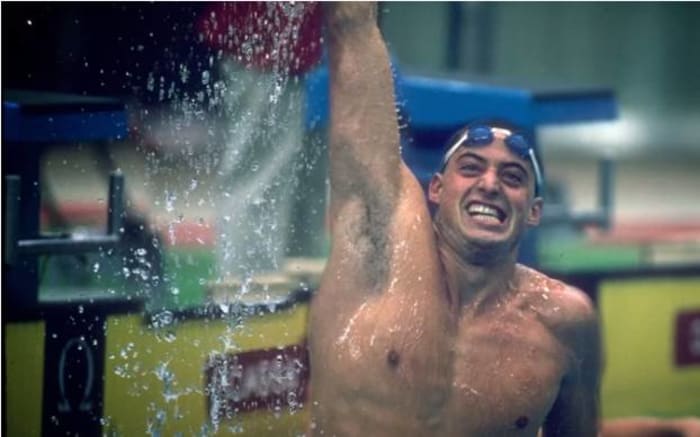
When Matt Biondi's Olympic swimming career ended, he was an 11-time medal winner -- eight of which were gold. His greatest Olympic moment came during the 1988 Summer Games in Seoul. Biondi won a remarkable five gold medals -- 50-meter freestyle, 100 free, 4x100-meter freestyle relay, 4x200 free relay, and 4x100 medley relay at those Games. That would be impressive on its own. But Biondi went one step further by setting a world record in the 50 and as part of all three relays. For good measure, Biondi also won silver in the 100 butterfly and bronze in the 200 free at Seoul.
Louganis back-to-back (1988)
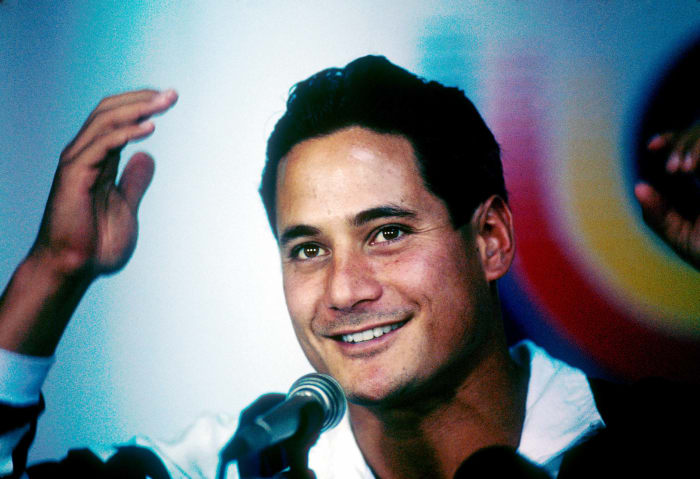
A five-time Olympic medal winner, Greg Louganis is the only male diver to win back-to-back Olympic gold medals in the 3-meter springboard and platform (1984 and '88). The latter, however, did not come without intrigue. During the '88 Games, Louganis had not alerted the world he was HIV+. So, when he slammed on his head on the springboard during the preliminary rounds and suffered a concussion, Louganis was horrified that others could come in contact with any blood on the board or in the water. That was never the case, and Louganis bounced back to remain the king of the Olympic diving well.
"Flo-Jo" goes for more (1988)

Now known as "Flo-Jo," Florence Griffith Joyner had already planted her Olympic flag in 1984, but became a national athletic and pop culture icon after her performance at the 1988 Seoul Games. She won the 100 meters (roughly .30 seconds ahead of silver medalist Evelyn Ashford), set the world record in the 200 (21.34 seconds), and was part of the gold-medal-winning 4x100-meter relay squad and the 4x400 team that finished second.
Won it by that much (1992)

Gail Devers was a two-time gold-medal winner at the 1996 Atlanta Games, but her greatest individual Olympic moment came four years earlier in Barcelona. In one of the most competitive 100-meter races in the history of the Olympics, five runners found themselves part of a photo finish -- officially within 0.06 seconds. In the end, however, it was Devers who edged Jamaican Juliet Cuthbert for the gold.
"The Dream Team" dominates (1992)
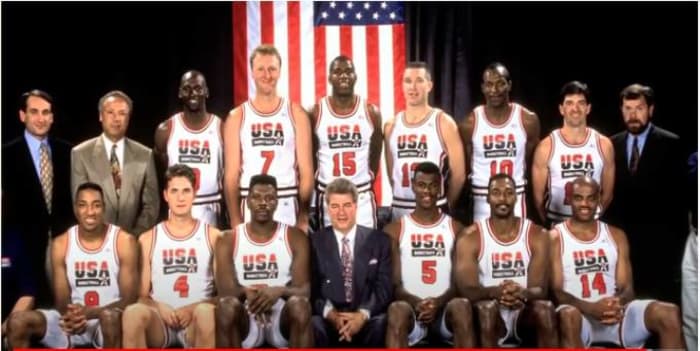
With a roster that included Michael Jordan, Larry Bird, Magic Johnson, and Charles Barkley, the U.S. men's basketball team should have been given their gold medals well before the 1992 Summer Games. The Americans dominated every game as expected, with its closest margin of victory coming by 38 points versus Puerto Rico in the semifinals. They beat Venezuela 80-47 in the gold-medal contest. Barkley averaged a team-leading 16.3 points -- one of seven players averaging double-figure points.
Ali's touching torch moment (1996)
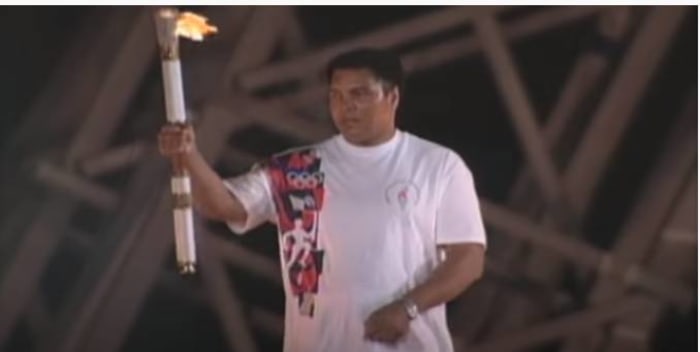
There might not have been a more moving or emotional moment in the history of the Olympics than July 19, 1996. The Opening Ceremonies of the 1996 Atlanta Games were quite the production, as expected. However, the house was truly brought down when the great Muhammad Ali, amid declining health due to Parkinson's disease, received the torch and lit the cauldron to officially open the Games that included plenty of triumphs and an unforgettable moment of tragedy.
Johnson's golden double delight (1996)

A 200- and 400-meter double is a grueling task for even the elite sprinters in the world. However, the great Michael Johnson made it look easy at the 1996 Summer Games in Atlanta. Sporting his gold track shoes, Johnson became the only male athlete to win both the 200 and 400 in the same Olympics. If that wasn't enough, he posted a world-record 19.32-second time in the 200. Four years later at the Sydney Games, Johnson repeated as 400 Olympic champion.
Kerri can do it (1996)

After severely injuring her ankle on an earlier vault, Kerri Strug had no time to wallow. Not with the first-ever American Olympic gymnastics team title within their grasp. Hobbled, but not totally hampered, Strug delivered one of the gutsiest performances in U.S. Olympic gymnastic history by sticking her vault landing long enough to secure a score that clinched the team gold for the U.S. The image of U.S. coach Béla Károlyi carrying Strug out for the medal ceremony remains a piece of Olympic iconography.
One last golden moment (1996)

Some 12 years removed from his dominant Olympic debut at the 1984 Summer Games, Carl Lewis was ready for an almost equally memorable swan song in 1996 -- also on American soil at Atlanta. Lewis did not win four golds in the 1996 Games at Atlanta, but he did complete a rather impressive feat. With Lewis' somewhat unexpected first-place finish in the long jump in '96, he became just the third athlete to win gold in the same event at four consecutive Olympics.
Williams' sisters win doubles gold (2000)

A day after Venus Williams won singles gold during the women's tennis competition at Sydney in 2000, she teamed up with sister Serena to easily dispatch Netherlands' pair Kristie Boogert and Miriam Oremans, 6-1, 6-1, to win doubles gold for the United States. With Venus and Serena each saying they will not take part in this summer's Tokyo Games, it's time to get a little nostalgic.
Wilkinson's improbable win (2000)

Talk about perseverance. Six months before the 2000 Summer Games in Sydney, Laura Wilkinson broke her foot. She still wasn't fully recovered during qualifying for the Sydney Games. After the first of her five Olympic dives on the 10-meter platform, Wilkinson was sitting in eighth place. However, that wasn't enough to keep her down. She re-focused, started nailing her dives, and moving up the standings. It came down to her final dive, a two-and-a-half somersault with a one-half twist. Wilkinson nailed it and China's Chinese Li Na finished poorly, opening the door for Wilkinson's Olympic gold.
Sheets, U.S. stun Cuba (2000)

With legendary Los Angeles Dodgers skipper Tommy Lasorda running the show, USA baseball made a seemingly improbable run to the gold medal at the 2000 Sydney Games. Cuba was the undisputed gold standard in international baseball, and after the U.S. rallied for a 3-2 semifinal win over South Korea, the two teams met with a gold medal on the line. In the greatest game in the history of USA Baseball, Ben Sheets tossed a three-hitter and the Americans stunned mighty Cuba with a 4-0 victory.
Rulon rules the day (2000)

When talking about the greatest upset in the history of the United States' participation in the Summer Olympics, the name Rulon Gardner tends to be near the top of the list. When Gardner faced dominant Russian Aleksandr Karelin in the gold-medal match of the 130 kg division, he was hardly given a chance. Karelin hadn't lost an international match in 13 years or allowed a point in six years, but the upstart Gardner delivered the performance of his life to shock the Greco-Roman wrestling world and win gold.
Patterson ends all-around drought (2004)

Twenty years after Mary Lou Retton vaulted her way into international fame to win the women's gymnastics all-around at the 1984 Los Angeles Games, Carly Patterson became the first American to repeat the feat. In fact, many Olympic historians believe Patterson's accomplishment at Athens might be more impressive considering the '84 Games were boycotted by the Soviet Union and its vaunted gymnastics program. Patterson also brought home two silvers (team, balance beam) from Athens.
USWNT digs deep for gold (2004)

In one of the most entertaining team competitions in Olympic history, the United States' women's national soccer team and Brazil got together for an instant classic to decide the gold medal in 2004. After the Brazilians leveled the match at 1-1 with a 73rd-minute goal, American legend Abby Wambach scored the go-ahead, and eventual winner, in extra time (112th minute). It kicked off a string of three consecutive gold medals for U.S. women.
An Athens' appetizer (2004)

Michael Phelps laid the foundation for his Olympic swimming dominance at the 2000 Games in Sydney, despite not even winning a medal. The experience was good enough. So, when he returned to the Olympic stage as a 19-year-old at Athens in 2004, Phelps was ready to command the pool and start the hype machine. He won eight total medals in 2004 and matched a record with six golds (100-meter butterfly, 200 fly, 200 medley, 400 medley 4x200 freestyle relay, 4x100 medley relay).
Coughlin's massive medal haul (2008)

Olympic success isn't always measured by the type of medal one wins. Sure, all Olympic athletes strive for gold, but swimmer Natalie Coughlin enjoyed one of the greatest individual moments in American history at Beijing in 2008 -- and she finished first just once. Coughlin became the first U.S. woman in the modern Olympic era to win six medals at a single Games. While she became the first female to win back-to-back golds in the 100-meter backstroke, Coughlin also earned two silvers (4x100 freestyle relay, 4x100 medley relay) and three bronze medals (100 free, 200 medley, and 4x200 free relay).
Move over Mark (2008)

Michael Phelps' true moment of Olympic greatness came in 2008 in Beijing. These were the Games that cemented and defined his legacy at the same time. With his eight gold medals at the Games, Phelps topped Mark Spitz's 1972 mark of seven. Five of those first-place finishes came individually and the other three as a relay members. Perhaps most impressive about Phelps' performance at Beijing, was that he set -- or as part of -- seven world-record swims. He had to settle for an Olympic record in the 100-meter butterfly.
Lezak's relay rally (2008)
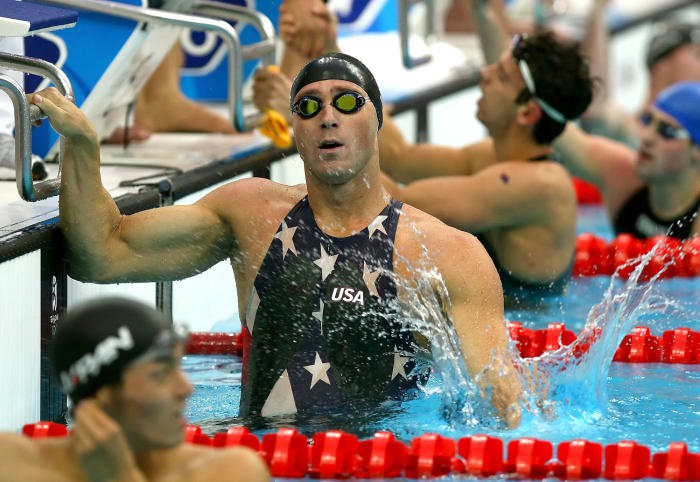
Michael Phelps would not have won an Olympic-record eight gold medals at the 2008 Summer Games at Beijing if it wasn't for teammate Jason Lezak's remarkable anchor leg in the 4x100 freestyle relay. Trailing France's Alain Bernard by roughly a body length, Lezak never stopped churning and dug deeper than anybody thought possible to eventually catch and edge the French star and give the U.S. an improbable relay gold medal thanks to what is considered the greatest relay leg in American swimming history.
Teen Shields golden in women's boxing debut (2012)

During the 2012 Games in London, women's boxing made its rather long-awaited debut on the Olympic program. One of the three gold medals at those Games went to American Claressa Shields. At 17 years of age, Shields beat Russia's Nadezda Torlopova in the gold-medal match to claim the middleweight division and make history at the same time. Shields was one of two American's to earn a boxing medal in 2012.
Teen Ledecky shatters record (2012)

At the London Games in 2012, Katie Ledecky went from a promising 15-year-old American swimmer to an Olympic superstar almost overnight. In her first international competition, Ledecky won the 800-meter freestyle, stunning the world in a race she wasn't expected to win. Talk about a coming-out party. But, Ledecky handled it all with poise and grace and opened the door for even more greatness four years later.
Douglas makes all-around history (2012)

Gabby Douglas, 16-years-old at the time, broke ground in London in 2012, when she became the first African-American female gymnast to win the Olympic individual all-around. It was a breakthrough of sorts in the sport, especially in the United States. Adding to the fun and memories, Douglas and her American teammates also finished first in the team competition. Douglas and the U.S. women's repeated a team of gold-medal winners four years later.
"Sisterhood" sweep (2016)

The U.S. Olympic team enjoyed massive success at the 2016 Rio Games, winning 121 total medals, including 46 gold, to lead all nations. One of the more monumental, yet seemingly less-talked about moments, for the American came in the women's 100-meter hurdles. For the first time in U.S. Olympic history, the Americans swept the medal run with Brianna Rollins first, Nia Ali second and Kristi Castlin finishing third for the bronze. "It's like a sisterhood," Rollins proclaimed. "think that it’s just very good to be a part of this whole black girl magic movement."
Manuel the magnificent (2016)

There have been several historically and culturally significant triumphs in the history of the Summer Olympic Games. Among the most noteworthy is Simone Manuel's victory in the 100-meter freestyle at the 2016 Summer Games. With that win (actually a tie with Canada's Penny Oleksiak). Manuel became the first female African-American swimmer to claim individual gold. Not to mention, set both an American and Olympic record.
Ledecky outdoes herself (2016)

If Olympic fans thought Katie Ledecky stole the show as a promising 15-year-old in 2012, she blew the roof off Rio's aquatic center in 2016. Her four gold medals (200-meter freestyle, 400 free, 800 free, and 4x200 relay) and a silver (4x100 relay), plus two world records in the process, made her the most decorated female at the Rio Games. She'll look for a third consecutive gold in the 800 at Tokyo this summer.
Sensational Simone (2016)

From one Simone to the other. Simone Biles might be the most popular active, American Olympian on the planet. She's personable and confident. Not to mention she's a pretty good gymnast. Biles' four gold medals (all-around, team, vault, floor exercise) at the 2016 Rio Games were the most ever by a U.S. women's gymnast at a single Olympics. It also marked the first time since Romania's Ecaterina Szabo in 1984 that any gymnast won gold four times at a single Games.
Phelps' swan song (2016)

Talk about going out in style. In his fourth and final Olympic competition at Rio in 2016, Phelps won five gold medals (200-meter butterfly, 200 medley, 4x100 free, 4x200 free, 4x100 medley) and a silver (100-meter butterfly). When he hopped out of the pool for the final time at Rio, Phelps solidified himself as the most decorated Olympian in the history of the Games -- Winter or Summer -- with 28 medals. Of that total, 23 were of the gold variety.
A Chicago native, Jeff Mezydlo has professionally written about sports, entertainment and pop culture for nearly 30 years. If he could do it again, he'd attend Degrassi Junior High, Ampipe High and Grand Lakes University.
More must-reads:
- Tokyo considering ban on Olympic spectators amid state of emergency
- Jessica Springsteen, daughter of rock legend Bruce Springsteen, selected to U.S. Equestrian Olympic team
- The 'Most career passing touchdowns' quiz
Breaking News
Customize Your Newsletter
 +
+
Get the latest news and rumors, customized to your favorite sports and teams. Emailed daily. Always free!
Use of this website (including any and all parts and
components) constitutes your acceptance of these
Terms of Service and Privacy Policy.

